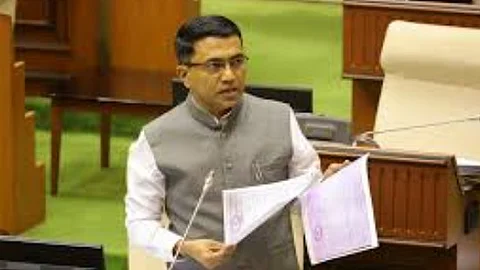

In a fiery session of the Goa Legislative Assembly, lawmakers from across party lines hit out at the Goa University Act of 1984, calling it “colonial in nature” and ill-suited to the modern academic and administrative needs of the state’s premier higher education institution.
Raising a Calling Attention Motion, MLAs criticized the Act for lacking legislative audits, elected representation, and civil society consultation. “The Goa University today operates like an island of unaccountability,” said opposition leader Viresh Borkar. Legislators demanded a new Goa University Act, one that includes comprehensive reforms, five-year performance audits, stakeholder reviews, and stronger oversight mechanisms.
Much of the discussion stemmed from the recent leak of a physics examination paper at Goa University. Allegations emerged that a newly recruited faculty member illicitly accessed confidential material from a colleague’s cabin to assist his girlfriend. Shocking still was the accusation that senior university officials — including the Vice-Chancellor and Dean — attempted to shield the accused.
Social activist and whistleblower Kashinath Shetye claimed that his complaint at the Akshay police station was not formally registered, prompting accusations of institutional apathy. “The Vice-Chancellor is acting with impunity, and the system has failed to respond,” stated MLA Vijay Desai.
A committee headed by retired Justice R.M.S. Khandeparkar was constituted to probe the incident. The government confirmed that the report is being reviewed and will be forwarded to the Hon’ble Governor, who serves as Chancellor of Goa University.
Lawmakers said the situation points to a deeper malaise: years of misgovernance, lack of accountability, and structural opacity. “Despite having secured an A+ grade from NAAC, the university's governance fails the test of transparency, ethics, and statutory compliance,” a legislator argued.
The Assembly was informed that previous RTI applications from 2015 regarding faculty recruitment, promotions, and appointments went unanswered or received incomplete responses — a direct violation of Goa University’s statutes.
“The Act, amended only up to 2007 and 2017, still retains Union Territory-era provisions and offers no legislative audit mechanisms, no MLA representation on academic bodies, and no mandated public consultation on higher education policymaking,” legislators observed.
With Goa University approaching its Golden Jubilee in 2034, MLAs demanded that a new Goa University Act institutionalize annual performance reports, legal audits, stakeholder consultations, and public grievance redressal systems. They also called for a long-term academic vision document and performance-linked funding.
“The government must ensure the university becomes a source of pride, not concern. A public-funded university cannot be allowed to deteriorate into a second-class institution,” said one member.
Concerns were also raised over recent administrative actions, including faculty appointments allegedly influenced by domicile bias and decisions taken without proper consultation. “The Vice-Chancellor bypassed Executive Council discussions. Even senior academic bodies have been reduced to ceremonial status,” said another legislator.
Chief Minister Pramod Sawant assured the House that the government is taking the matter seriously. “We will review the Justice Khandeparkar report and forward recommendations to the Chancellor. An academic audit and a long-term vision plan are essential,” he stated.
Sawant reiterated that the Goa University Act provides a strong legal and academic foundation but acknowledged that its implementation remains weak. He assured the Assembly that reforms will be introduced and suggested forming a House Committee to oversee the university’s governance, especially in light of the exam scandal.
In closing, opposition leaders called for the formation of an independent regulatory audit team to assess compliance with existing statutes and rules. “We owe it to the people of Goa to ensure that our only state university lives up to the highest public standards,” said the Leader of Opposition. “Let’s not betray the future by ignoring the present.”
As the Assembly adjourned, the consensus was clear: Goa University, once a beacon of academic excellence, needs structural reforms, transparency, and visionary leadership to restore its reputation and serve the next generation.